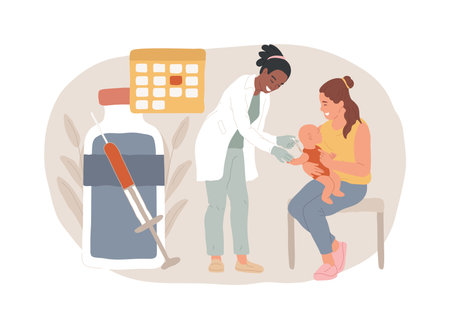Understanding the Role of Health Visitors
In the UK, health visitors hold a unique and vital position within the National Health Service (NHS), acting as bridges between families and community healthcare services. These professionals are qualified nurses or midwives who have completed additional specialist training in public health, child development, and family support. Their primary focus is on supporting families from pregnancy right through to a child’s fifth birthday—a period rich with developmental milestones and transitions.
Health visitors work proactively with parents, offering guidance that goes beyond physical health checks to include emotional wellbeing, child development, and parenting strategies. They visit families at home or see them in community clinics, ensuring care is accessible and tailored to individual needs. This approach not only empowers parents but also strengthens the early bonds between caregivers and children—an essential foundation for healthy psychological development.
Health Visitor Qualifications and Training
| Qualification | Description |
|---|---|
| Registered Nurse/Midwife | Must be registered with the Nursing and Midwifery Council (NMC) |
| Specialist Community Public Health Nursing (SCPHN) | Postgraduate qualification focused on public health, child development, safeguarding, and family support |
The Scope of Support Provided by Health Visitors
- Antenatal visits to prepare expectant parents
- Newborn checks and advice during the early weeks
- Ongoing developmental assessments at key milestones (such as 6-8 weeks, 1 year, 2-2½ years)
- Guidance on feeding, sleep routines, emotional attachment, and behaviour management
- Support with accessing wider NHS and community services when needed
This comprehensive support ensures that families feel confident navigating the early years of their child’s life—laying a strong foundation for lifelong wellbeing.
Key Milestone Checks: An Overview
In the UK, health visitors play a pivotal role in monitoring your child’s early development through a series of structured milestone checks. These assessments are designed not only to track physical growth but also to nurture emotional wellbeing and social skills, ensuring your child is thriving holistically. The checks are scheduled at specific ages to capture key stages in your little one’s journey, providing timely opportunities for guidance and support.
Standard Health Visitor Developmental Checks
The following table outlines the typical schedule of milestone checks carried out by health visitors across the UK:
| Age of Child | Check Name | Main Areas Assessed | Purpose |
|---|---|---|---|
| Newborn (within 14 days) | New Birth Visit | Feeding, weight, bonding, parental wellbeing | Support transition home, identify early needs, establish relationships with parents |
| 6–8 weeks | 6–8 Week Review | Growth, feeding patterns, early responses, maternal mental health | Monitor adjustment post-birth, highlight early developmental signs |
| 9–12 months | 1 Year Review | Physical milestones (sitting, crawling), communication, sleep routines, immunisations | Assess motor skills and social interaction; address parenting questions |
| 2–2½ years | 2–2½ Year Review | Speech and language, movement, behaviour, toileting | Early identification of developmental delays; school readiness conversations begin |
The Purpose Behind Each Check
Each visit is more than just a tick-box exercise; it offers a moment for families to pause and reflect on their child’s unique progress. Health visitors use these sessions to foster open conversations about parenting challenges and celebrate achievements—big or small. They can also refer families to specialist support if there are concerns about development or parental wellbeing. These collaborative reviews help ensure every child has the best possible start in life within the context of their family and community.

3. What to Expect at Each Stage
Navigating health visitor milestone checks in the UK is an integral part of your child’s early years journey. These reviews offer not only important developmental assessments but also a unique opportunity to build a trusting relationship with your health visitor, where your voice as a parent is valued and heard. Here’s a breakdown of what typically happens at each key stage:
Newborn Visit (10–14 days)
This first visit takes place at home, creating a comfortable environment for both parent and baby. Your health visitor will:
- Discuss feeding patterns, sleep routines, and nappy changes
- Check baby’s weight and general wellbeing
- Offer emotional support and guidance for new parents
- Talk through safe sleeping practices and bonding tips
Common Parent-Health Visitor Interactions
Expect gentle questions about how you’re coping emotionally, any concerns about feeding or settling, and an open invitation to share your feelings or worries.
6–8 Week Review
This check may take place at home or at a clinic. The focus is on early development and parental adjustment:
- Reviewing baby’s growth and physical development
- Assessing early communication cues, such as eye contact and responding to voices
- Supporting parental mental health and discussing postnatal depression signs
- Providing information about immunisations and local parent groups
Key Areas Checked
| Area Assessed | What Health Visitor Looks For |
|---|---|
| Physical Growth | Weight gain, head circumference, length |
| Feeding & Sleep | Feeding routines, sleep patterns, settling techniques |
| Bonding & Attachment | Parent-infant interaction, bonding activities |
| Mental Health Support | Mums emotional wellbeing, support networks |
1-Year Review (9–12 months)
This appointment usually takes place in a clinic setting. At this stage, the focus widens to include more complex aspects of development:
- Tracking gross motor milestones like sitting up and crawling
- Monitoring fine motor skills—grasping objects, finger foods
- Encouraging first words and babbling conversations
- Discussing diet transitions (e.g., introducing cow’s milk)
- Tackling family routines, safety in the home, and social development
A Nurturing Approach to Assessment
Your health visitor may ask you to demonstrate how your child plays or interacts with you. This shared observation helps highlight your child’s strengths while gently supporting any areas that might need extra attention.
2–2.5 Year Review
This crucial review often happens in clinics or children’s centres. It provides a holistic snapshot before preschool:
- Assessing speech, language, and communication skills using play-based approaches
- Reviewing physical abilities—jumping, running, drawing simple shapes
- Exploring social skills like sharing and turn-taking with peers or siblings
- Troubleshooting common challenges such as fussy eating or tantrums
- Liaising with other services if additional needs are identified (e.g., speech therapy)
| Milestone Area | Example Questions/Activities from Health Visitor |
|---|---|
| Speech & Language | “Can your child put two words together?” “Let’s see how they respond to simple instructions.” |
| Physical Skills | “Can they jump with both feet?” “Show me how they hold a crayon.” |
| Social Development | “How does your child play with others?” “Do they enjoy group activities?” |
| Behavioural Challenges | “Are there any concerns about tantrums or eating habits?” “What strategies have you found helpful?” |
The milestone checks are collaborative: health visitors work alongside you as partners in nurturing your child’s growth. These appointments aren’t just about ticking boxes—they are about celebrating achievements, spotting opportunities for support early on, and strengthening the bond between you, your child, and the wider community.
4. Supportive Conversations: Building Parent Partnership
Health visitors play a crucial role in establishing supportive and meaningful conversations with parents throughout milestone checks in the UK. These interactions are not just about ticking developmental boxes—they are opportunities to nurture genuine partnerships that empower families and enhance child development outcomes.
Encouraging Parental Engagement
Health visitors understand that every family is unique, and they strive to create an open, welcoming atmosphere during visits. By using clear, non-judgemental language and showing empathy, they encourage parents to share their insights, observations, and any concerns about their child’s progress. This approach not only reassures parents but also builds trust, which is vital for effective collaboration.
Responding to Concerns Sensitively
When parents voice worries—be it about feeding, sleep patterns, speech development or behaviour—health visitors respond with understanding and expertise. They use active listening skills and ask gentle, open-ended questions to better understand the family’s experience. Where appropriate, they provide reassurance or offer practical strategies that parents can try at home. If further support is needed, health visitors can signpost families to local services such as speech therapy or parenting groups.
Collaborative Decision-Making for Optimal Outcomes
The process of developmental assessment is collaborative by design. Health visitors value parental input as an essential part of the assessment process. Together, they review the child’s progress against expected milestones and decide on next steps if any areas need extra attention. This joint approach helps ensure that plans are realistic, culturally appropriate, and tailored to each family’s needs.
Key Elements of a Supportive Conversation
| Element | Description |
|---|---|
| Empathy | Listening without judgement and acknowledging parental feelings. |
| Information Sharing | Explaining developmental expectations clearly in everyday language. |
| Joint Problem-Solving | Working together to identify solutions or next steps if concerns arise. |
| Follow-Up | Agreeing on how progress will be reviewed and what additional support may be offered. |
This collaborative ethos lies at the heart of the UK’s health visiting service, ensuring that families feel valued, understood, and supported as their children grow and develop.
5. Navigating Concerns and Next Steps
It’s natural for parents to feel a mixture of anticipation and anxiety during Health Visitor milestone checks, especially if developmental differences emerge. The UK system is designed to support families through these moments, ensuring every child receives the help they need at the right time.
Identifying Developmental Differences
Health Visitors are trained to spot early signs of developmental delay or differences during routine checks. They use standardised tools and their professional judgement, while always considering your observations as a parent. Open communication is encouraged—if you notice something unusual about your child’s development, don’t hesitate to share your concerns.
Common Signs Health Visitors Look For
| Area of Development | Examples of Concerns |
|---|---|
| Speech & Language | Limited words for age, difficulty understanding instructions |
| Movement & Coordination | Trouble sitting, crawling, or walking compared to peers |
| Social Interaction | Lack of eye contact, minimal response to social cues |
| Emotional Wellbeing | Persistent distress, trouble self-soothing |
The Referral Process in the UK
If a concern is identified, Health Visitors will discuss the next steps with you. This may involve monitoring progress over time or making a referral to specialist services such as speech and language therapy, physiotherapy, or paediatric assessment clinics. Here’s how the process typically unfolds:
| Step | Description |
|---|---|
| 1. Discussion | Your concerns and Health Visitor observations are reviewed together. |
| 2. Observation Period | Some issues may be monitored over a set period before deciding on further action. |
| 3. Referral | If needed, your Health Visitor completes a referral form for relevant specialists. |
| 4. Assessment | A specialist service contacts you for further assessment and support. |
Advocating for Your Child: Parental Involvement Matters
Your voice as a parent is vital in the UK’s child health system. If you feel something isn’t quite right—even if it wasn’t flagged during a check—trust your instincts. You can:
- Request an additional appointment with your Health Visitor or GP.
- Keep a diary of behaviours or symptoms to share with professionals.
- Ask for clarification on any aspect of your child’s development or care plan.
- Seek second opinions if you feel your concerns aren’t being fully addressed.
- Connect with local parent groups or charities (e.g., Contact, National Autistic Society) for support and guidance.
The Importance of Early Intervention
Early identification and intervention can make a world of difference in your child’s long-term outcomes. The collaborative relationship between parents and Health Visitors is at the heart of this approach, ensuring that every child has the best chance to thrive within their unique developmental journey.
6. Cultural Sensitivity and Inclusive Practice
Health visitors in the UK play a crucial role in supporting children’s development within families of diverse cultural, religious, and linguistic backgrounds. Understanding that each family brings its own set of values, beliefs, and traditions, health visitors approach milestone checks with sensitivity and respect, ensuring that all families feel valued and included throughout the assessment process.
How Health Visitors Adapt to Cultural Diversity
Health visitors recognise that parenting practices, child-rearing expectations, and communication styles can differ widely across communities. To foster trust and meaningful engagement, they adopt an inclusive approach by:
- Using interpreters when language barriers exist, ensuring clear communication without assumptions or misunderstandings.
- Recognising cultural norms around feeding, sleep routines, and developmental milestones, asking open-ended questions rather than making judgments.
- Respecting religious practices, such as dietary restrictions or prayer times, during home visits or clinic appointments.
- Providing tailored resources, offering translated materials or culturally relevant guidance where appropriate.
Cultural Considerations in Developmental Assessments
The table below highlights examples of how health visitors adapt their approach to meet the needs of families from different backgrounds:
| Aspect of Care | Inclusive Practice Example |
|---|---|
| Language Support | Arranging interpreters for milestone checks; providing leaflets in multiple languages. |
| Cultural Beliefs on Child Development | Discussing family perspectives on milestones; acknowledging differences in what is considered ‘typical’ development. |
| Religious Observances | Scheduling visits around prayer times; being mindful of fasting periods (e.g., Ramadan). |
| Family Structures | Engaging extended family members if relevant; respecting roles of grandparents or carers. |
Building Trust with All Families
A respectful, non-judgemental attitude is at the heart of every health visitor interaction. By actively listening and adapting their assessments to each family’s unique context, health visitors help parents feel empowered and understood. This inclusive practice not only supports optimal child development but also strengthens community cohesion across the UK’s wonderfully diverse population.


